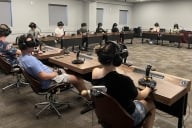You have /5 articles left.
Sign up for a free account or log in.
Under New York Gov. Andrew Cuomo’s proposed plan for tuition-free public higher education, online degree-granting institutions and their students have much to gain.
The Excelsior Scholarship Program would provide free tuition at public two- and four-year colleges for online or in-person classes to students whose families earn less than $125,000 each year. Tuition would be covered for students enrolled in the State University of New York (SUNY) and the City University of New York systems, and Open SUNY, the systems' online arm.
If approved by the state legislature, the program, announced in January, will launch this fall and be fully implemented by the end of 2019.
“We are thrilled with this initiative from the governor,” said Kim Scalzo, executive director of Open SUNY. “It really places a priority on higher education and aligns with our mission of expanding access to higher education.”
Open SUNY offers more than 500 degree programs across all levels of post-secondary education. Since its launch in 2014, about 8,000 students have earned a degree or certificate by taking the majority of their classes online. Still, Open SUNY courses are more commonly used to complement the offerings of the system's physical campuses.
About 160,000 of SUNY’s 440,000 students have taken an online course through Open SUNY, according to Scalzo, and more than one-third of students at SUNY’s 64 campuses take online courses.
If free tuition if offered, Scalzo said she expects the Excelsior Scholarship Program to be most beneficial to full-time students who blend online and face-to-face courses into their schedules.
“It provides a significant amount of growth opportunity there,” she said.
The overall SUNY system awards about 90,000 degrees annually. By 2025, it wants to be granting about 150,000 degrees each year; Open SUNY and the Excelsior program can be major components helping achieve that goal, Scalzo said.
Adding Students and Resources
The Excelsior program would provide healthy expansion to Open SUNY in terms of students and resources, Scalzo said. A tuition-free Open SUNY would attract people who have never considered higher education within their reach, leading to a surge in online enrollment. That, in turn, would increase demand for the programs that support student achievement and degree completion, she said.
Open SUNY already has several online programs to support the success of students – from prospective students to graduates. One tool is an online readiness assessment quiz that helps prospective students determine if they are prepared for the rigor and technological aptitude of Open SUNY’s online coursework.
Another is a personal concierge, who serves as a primary contact for online students. If students have questions or encounter an issue that could hurt their chances of passing a course or completing their degree, the concierge offers suggestions to get them back on track. Sometimes the students will ask for help, but in other cases, the concierge recognizes a weak spot -- through access to students' records -- and offers support.
Open SUNY also provides virtual tutoring so online learners have the same access to academic assistance as students who attend class in a physical building and who interact with their professors regularly.
Finally, there is an initiative to expand the use of early alert systems, which Scalzo described as “technology solutions that tap into how students are doing and allow faculty and support services to intervene.” For example, if a scholarship or financial aid deadline is approaching and the student hasn’t submitted his or her application, the alert system reminds the individual of the looming deadline. Or, if students' grades begin to dip -- maybe lower than their scholarships allow -- the system sends alerts so they can seek academic support.
Cuomo’s tuition-free plan potentially could help SUNY scale all these programs and invest more time and resources in tightening the details associated with them, Scalzo said. The first step, she said, is reaching prospective students who could benefit from a SUNY education.
"The opportunity of free tuition, combined with the flexibility of online delivery through Open SUNY, puts going back to college in reach for New Yorkers who thought...college was out of reach for them," Scalzo said.
“It’s really about helping [students] be successful,” she added. “I think there are some really great opportunities with technology [for] that."







